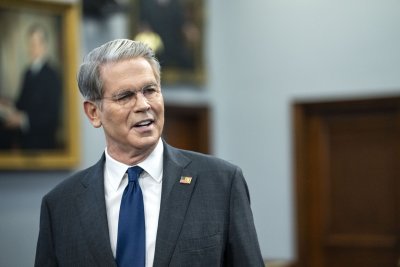
May 11 (UPI) — High-level trade talks between the United States and China are continuing Sunday in Geneva, marking the second day of negotiations between the two countries in the hope of ending President Donald Trump‘s trade war.
“A very good meeting today with China, in Switzerland. Many things discussed, much agreed to. A total reset negotiated in a friendly, but constructive, manner,” Trump said on his Truth Social platform after Saturday’s negotiations.
“We want to see, for the good of both China and the U.S., an opening up of China to American business. GREAT PROGRESS MADE!!!”
The U.S.-China trade war ignited earlier this year when Trump returned to office and imposed a 10% tariff on Chinese imports, citing national security concerns linked to the American fentanyl crisis.
Tensions escalated rapidly and, by April, tariffs surged to 145% on Chinese goods, prompting Beijing to retaliate with 125% duties on U.S. exports. The tit-for-tat measures have disrupted global supply chains and fueled fears of a global economic slowdown.
China’s Xinhua state news agency published an op-ed Sunday that welcomed the high-level talks but affirmed China’s determination to safeguard its economic interests, whether through “fighting” back with reciprocal tariffs or through negotiations.
“In this context, it is of positive significance for the two sides to sit down and talk, which is a necessary way to resolve differences and avoid escalation of conflicts,” reporter Fan Yu wrote for Xinhua.
“However, the effectiveness of the dialogue depends on the sincerity and efforts of both sides, especially whether the United States can truly be rational and pragmatic. China has always believed that any dialogue and negotiation must be carried out on the premise of mutual respect, equal consultation, mutual benefit and mutual benefit.”
In a separate editorial Saturday, edited by Zhao Yang, Xinhua also criticized the Trump administration for provoking the trade war “without sufficient planning and careful consideration” and asserted that if the two countries were to decouple, the U.S. economy would become poorer, citing data from the Oxford Economics Institute.
“Any US action will trigger a Chinese response. Take technology as an example. Although the US has restricted China’s access to cutting-edge chips, is this effective?” the editorial reads.
“In the fields of chip manufacturing and artificial intelligence, Chinese companies such as Huawei and DeepSeek seem to be able to produce close to cutting-edge technological achievements at a much lower cost than the United States.”
China’s Ministry of Commerce has separately been seeking to strengthen trade with Switzerland, a move also underway by U.S. Treasury Secretary Scott Bessent. It said in a statement that Swiss Vice President Guy Parmelin expressed support for “multilateralism and free trade.”
Switzerland, known for its significant role in international finance and trade, could serve as a pivotal partner in diversifying trade relationships and mitigating the impacts of the U.S.-China trade tensions.
“Very productive meetings alongside U.S. Trade Representative Jamieson Greer yesterday with President Keller Sutter and Vice President Guy Parmelin of the Swiss Confederation,” Bessent said in a statement on social media.
“I am glad that we have agreed on accelerated trade talks, and we expect that a detailed Swiss proposal will be submitted to Ambassador Greer by next week.”
Bessent expressed optimism around Swiss negotiations on the heels of Trump’s recent trade agreement with Britain.